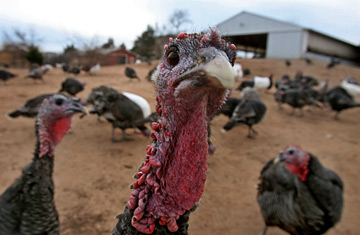
A turkey on a turkey farm.
Langmo Farms runs about a million birds a year through 12 barns. Each barn generates an estimated 33 semi-truckloads of manure and litter a year. A few years back, as the suburbs crept closer, complaints began and local officials told the farmers to do something about the turkey-poop stench. That's when Langmo lit on a solution using technology launched by a British company — burn the poultry litter as fuel for a steam turbine, which creates electricity that can be sold to the nation's power grid. And by-products from the burn are still sold as fertilizer.
The result of his work: Fibrominn LLC, America's first poultry-litter biomass power plant, which flipped its switch Monday at a plant on the western edge of Benson, Minn. Benson city officials admit when they first heard the idea, they chuckled. Yes, the community of 3,376 residents has embraced recycling, launching one of the nation's first diaper recycling programs in the 1980s. The city even bought 50,000 shares in the experimental Chippewa Valley Ethanol Cooperative in the 1990s. But turkey poop as a source of electricity seemed a little — well, bird-brained.
"We joked about it on our way down to the first presentation," says City Manager Rob Wolfington. But by the time they headed back home from that 1998 meeting, Wolfington admits they were talking turkey.
"We're a small town on the edge of the prairie trying to survive," says Mayor Paul Kittelson. "We certainly have a lot of this fuel around." In fact, Minnesota currently ranks No. 1 for turkey production in the United States, raising about 44.5 million birds in 2005. The state has about 250 turkey producers who operate 600 farms, many within an hour or two drive of Benson, which is located about three hours west of the Twin Cities. Farmers in the region produce over a million tons of turkey litter each year.
The technology to turn that litter into electricity was developed by Scotsman Simon Fraser, whose job was to produce heat for a wood-burning distillery. The wood was expensive to come by, but his brother was running a poultry farm that needed to get rid of its waste. So Fraser decided to try burning it. After some experimentation to make the often wet litter more flammable, he managed to turn it into a stable fuel. The distiller, though, didn't embrace the idea, so Fraser launched out on his own, subsequently opening three power plants in Britain.
The Frasers — the company is chaired by son Rupert Fraser — have now come to the U.S. In addition to the Minnesota plant, the Newtown, Penn.-based company is looking at several other locations in North Carolina, Arkansas, Maryland and Mississippi. "Really, we're all about restoring the environmental balance," says the younger Fraser. "We're creating energy; we're encouraging the sustainability of the poultry industry; and the fertilizer that is produced from the ash is really popular with the farmers."
The $202 million Minnesota plant, which began construction in 2004, will generate about 55 megawatts of electricity from the 700,000 tons of turkey litter and other agricultural biomass it expects to burn each year. The electricity is being sold to Xcel Energy under a 21-year power purchase agreement. "That's enough energy to fuel about 50,000 homes," says Fraser.
Back in Benson, townsfolk are embracing the idea of poop power. "I'm not an environmentalist," said Dr. Rick Horecka. "But it makes sense. The local farmers used to have to pay to get rid of this stuff. Now they'll get paid for it. It won't hurt the environment. And it produces something we need. There's a few skeptics, but we really are convinced it is a good thing for the community."
And for the wider public: Come Thanksgiving, some American households will have the additional blessing of knowing their dinner may have made a unique contribution to curbing greenhouse gas emissions.
